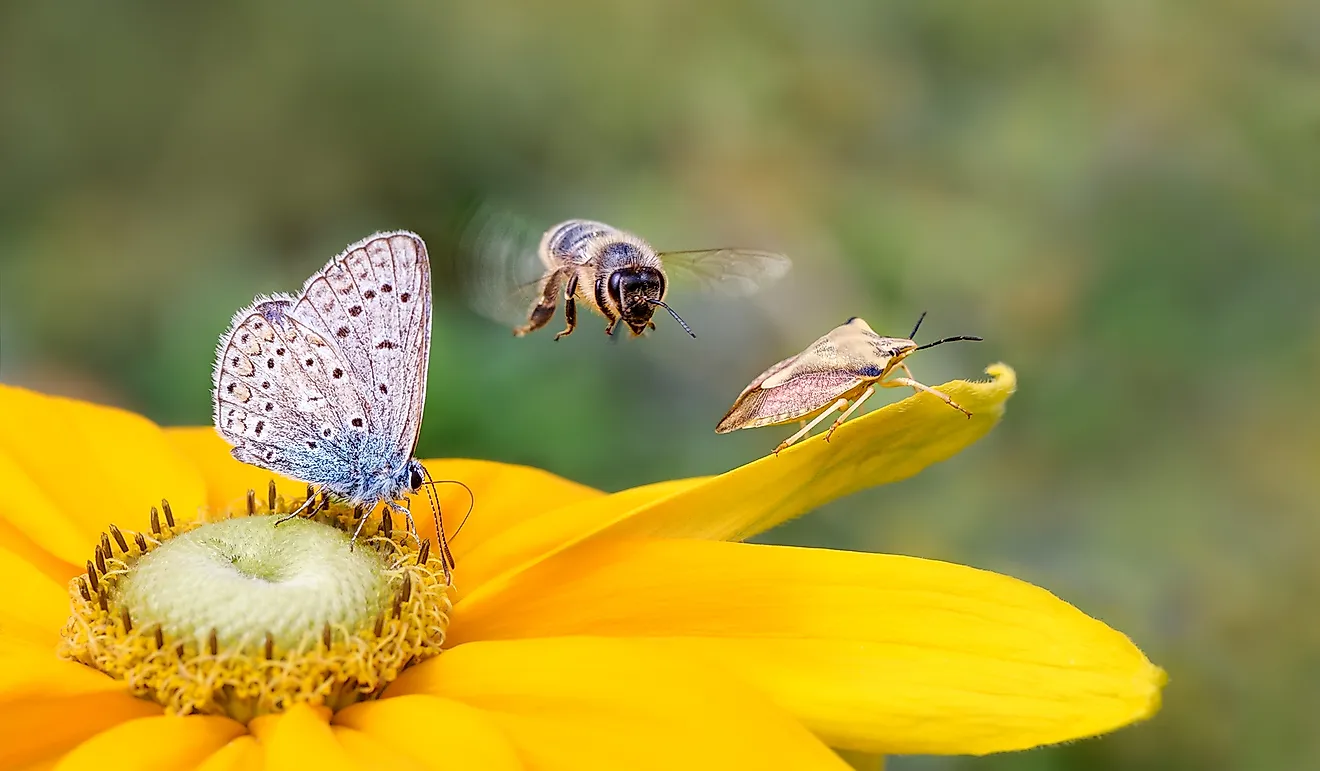What Is The Importance Of Insects In The Ecosystem?

The ecosystem can be defined as the complex of organisms, their environment, and their interrelationships in a given geographical area. Natural ecosystems provide invaluable services to humans and other organisms that are essential for their survival and well-being. Services provided by the ecosystem can include the provision of food, water, fiber, and other resources, while non-material benefits of the ecosystem can consist of recreation and aesthetic value. The ecosystem also supports pollination, primary production, decomposition, and soil formation, which is essential for resource production. Other vital aspects of the ecosystem include biological control and feedback mechanisms that ensure consistent delivery of services. While provided at no cost, the value of ecosystem services across the world is estimated at 33 trillion US dollars annually. Ecosystems are also responsible for several “disservices” such as litter, pests, diseases, poisonous and allergenic organisms, animal attacks, and geophysical hazards like floods. Many of the disservices listed are, however, exacerbated by increased anthropogenic destabilization of ecosystem structures, food webs, and processes responsible for the mitigation of events such as storms, floods, and other weather systems.
The Economic Value Derived From Insects
While all organisms in the ecosystem are essential, the role played by insects is particularly vital. Often under-appreciated and viewed by some as a nuisance, insects are “lever pullers of the world”. According to National Geographic, there are about 1.4 billion insects for every human on Earth, and all of them play a crucial role in the ecosystem. John Losey and Mace Vaughan, ecologists, based in the US, researched the economic contribution of insects in the United Statesand found it to be about $57 billion, not including the pollination. The value came mainly from wildlife, which is typically serviced by insects and forms an essential part of the food chain for birds, mammals, and fish. Insects are responsible for biological pest control that also accounts for an additional half-billion in value in the economy. Experts agree that the economic value derived from insects is, in some cases, unquantifiable. For example, it is difficult to calculate how much it costs to decompose plant life and dead bodies in the environment.
Pollination Of Plants
Insects are responsible for the pollination of about 80% of trees and bushes on the entire planet. Plants invest significant amounts of energy in the formation of attractive blooms full of nectar. Such features are produced primarily to attract insects that act as the chief agents of pollination for most of them. Some of the plant species that have developed such features include Maple, Cherry, Hawthorne, Buckthorn, Lime, and Rowan Berry. The relationship between plants and insects is very complex. Orchids, for example, have co-evolved with insects over millions of years and can only be pollinated by a single species of insect. After the examination of an orchid species found in Madagascar, Charles Darwin predicted that a moth would be discovered in the area with a proboscis that is 11 inches long. Scientists have since found a species of moth in the area that pollinates that orchid, which has a corolla tube with a length of 11 inches. Bees are some of the most important pollinators in the ecosystem. Insects such as bees usually pick up pollen in “baskets” formed by hairs on their abdomens or legs. Without bees, most of the plants we rely on would not be able to produce most of the food we eat. Most of the plants also would not be able to reproduce. Watermelons in Florida or almonds in California probably would not be available if it were not for bees. Declining pollinator populations in some areas have prompted governments to implement pest management and efficient land-use practices to promote pollinator activity. Today authorities understand the need to protect and restore habitats necessary for the sustenance of pollinator diversity.
Dispersal Of Seeds
Ants play a crucial role in the dispersal of fruit and seeds from plants. There are more than 150 species of plants that rely on insects for dispersal. Some plants produce fruit and seeds that are eaten and collected by ants. Seeds that are not consumed germinate along paths used by ants. By utilizing insects such as ants, plants ensure that their seeds are dispersed over long distances without having to rely on wind.
Decomposition Of Animal And Plant Matter
Insects play a vital role in the decomposition of animal and plant matter, which is essential for the release of nutrients that are later utilized for growing plants. Decomposition also helps in the removal of disease-causing organisms in carcasses. Dung beetles and termites are particularly crucial as they provide agricultural service by removing and assisting in the decomposition of livestock dung, thus limiting the fouling of pasture through the accumulation of excrement. Such services also help in improving water and carbon storage in soil, reduction of livestock loss as a result of blood-feeding flies, and the reduction of nitrogen loss due to volatilization and erosion. The importance of such services is best illustrated in Australia, where fouled pasture due to dung accumulation threatened livestock production in the country. Native dung beetles did not readily feed on dung produced by livestock because they are adapted to feeding on dung produced by native marsupials. The government was, therefore, forced to launch an expensive program that led to the introduction of predaceous mite and dung beetle species from different continents to get rid of dung and eliminate blood-feeding fly larvae found in the dung. The program illustrated the value and costs of services provided by insects.
Nutrition
Insects provide nutrition to other animals that include birds and humans. Typical insect feeders among the birds include woodpeckers, warblers, tits, cuckoos, and sparrows. Other wild insect-eating vertebrates are lizards, frogs, toads, mice, salamanders, and bats. Over 3,000 ethnic groups eat 2,086 species of insects across 130 countries. Insects are, therefore, an essential source of nutrition to many people around the world. Insect consumption is also increasingly becoming popular in different parts around the world. In Borneo, rice is served with a side of bugs blended with chilies and salt, and cooked in bamboo stems. In Mexico, chapulines (grasshoppers) are served with a lot of spices. In some African communities, caterpillars are very popular and are a great source of iron, zinc, potassium, and calcium. On the Island of Sardinia, people eat Casu Marzu – “crying cheese”- that is made with maggots. In some restaurants in Tokyo, insects of various kinds are also served. Insects require less energy for metabolism compared to livestock and poultry. Insects also produce protein, which is estimated to be 300 times more efficient than cattle. Replacing proteins produced by vertebrates with insect protein is likely to reduce greenhouse gas emissions significantly while also saving grain required for feed production. Adopting insect protein consumption is also proving very profitable. During a grasshopper outbreak in Mexico, harvesting of the insects generated $3,000 in revenue per family as opposed to the $150 cost that would have been incurred had control via insecticide treatment been implemented. Some experts predict that insect protein could be an essential food for the future.
Biological Control And Maintaining Ecological Balance
Predaceous insects and insectivorous vertebrates provide important environmental regulation mechanisms of various organisms, which include pest species. Biological control in the United States is valued at $5.4 billion per year. The economic benefit derived from the biological control in Costa Rica’s coffee sector alone is estimated to be between $75 and $310 per hectare each year. The financial gain per plantation is equal to the annual income of the average Costa Rica citizen. Predation by various insect species also helps in controlling disease vectors.
Cultural Services
Insect aggregations in different parts of the world are a delight to watch and often attract tourists who bring revenue to local communities. For example, in Mexico, aggregations of monarch butterflies attract tourists from around the world eager to watch the phenomenon.
Insects As Solutions To Global Challenges
Scientists think that insects are solutions to several environmental issues facing the world today. Insects can be used as part of comprehensive solutions to global challenges, including the provision of sustainable fuel, food production, and mitigating environmental degradation.
Conserving And Managing Insects In The Ecosystem
The management of insects, the ecosystem, and their interactions in a sustainable way is crucial for the survival of all organisms. Unfortunately, most people, especially those in urban environments, often lack appreciation for the significance of insects in the ecosystem that we depend on. Dependence on insects and the services they provide only becomes apparent when delivery is threatened. The consequences of interrupting sustainable delivery of services in the ecosystem can lead to famine, threats to human health, and economic disruption. Scientists believe that over 40% of insect species could go extinct in the not so distant future due to habitat loss. Attitudes towards the various taxa influence public support toward the conservation of species. Unfortunately, there exists widespread negativity towards insects, which consequently detracts efforts aimed at conservation. There are, however, several countries where insect conservation is being prioritized. Recently German environmentalists collected 1.75 million signatures to support a “save the bees” law that required immediate action and transition towards organic farming. Experts believe that such strategies addressing all insects need to be adopted in all countries across the world.











